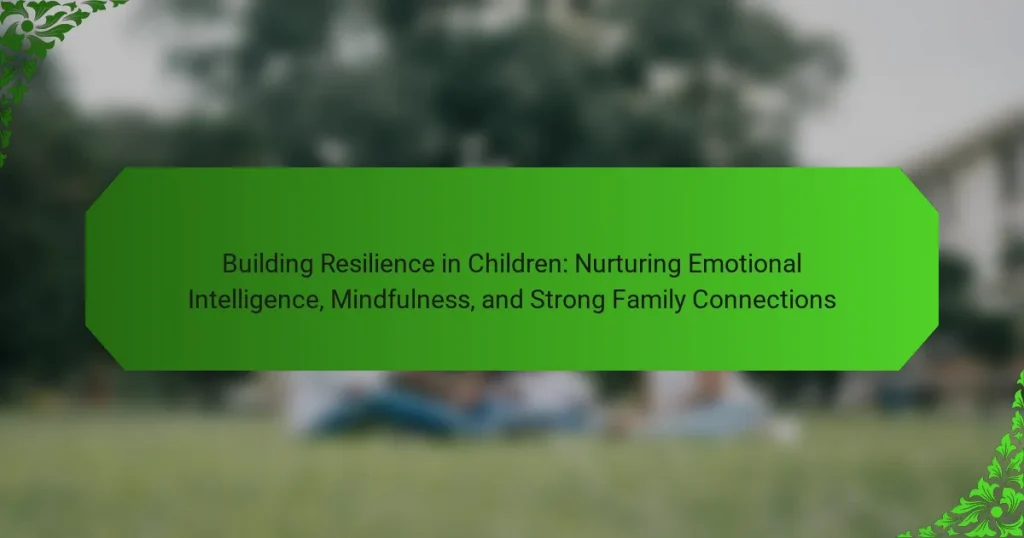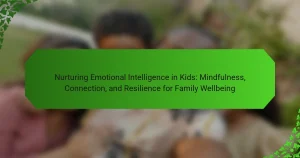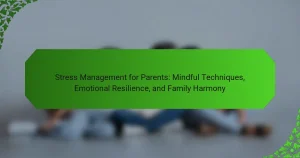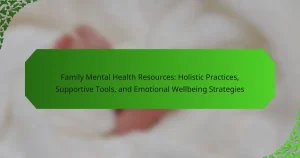Building resilience in children is crucial for their emotional well-being and adaptability. This article explores how nurturing emotional intelligence enhances their interpersonal relationships, how mindfulness practices improve stress management, and how strong family connections provide essential support. By fostering open communication and stability, families can create an environment that promotes resilience and effective coping strategies in children.
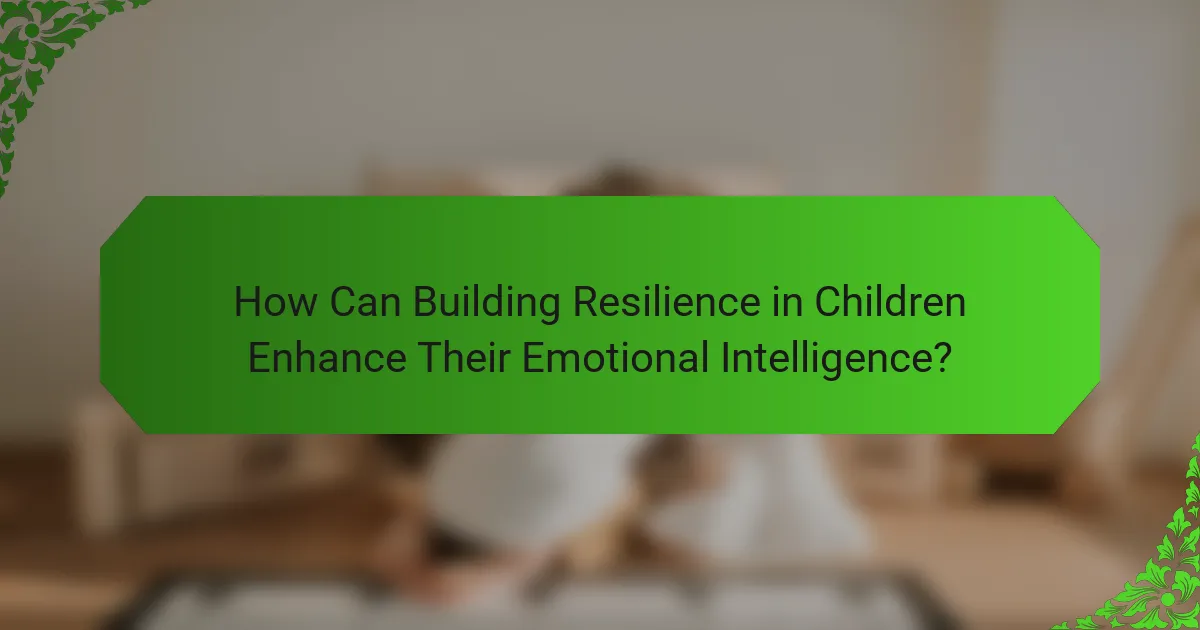
How Can Building Resilience in Children Enhance Their Emotional Intelligence?
Building resilience in children enhances their emotional intelligence by fostering adaptability and empathy. Resilient children learn to manage stress effectively, which boosts their emotional regulation. This skill enables them to understand and respond to the emotions of others, enhancing interpersonal relationships. Studies show that children with strong resilience exhibit higher emotional awareness, leading to better conflict resolution and social interactions. Additionally, nurturing resilience through supportive family connections and mindfulness practices cultivates a safe environment for emotional growth.
What are the key components of emotional intelligence in children?
Emotional intelligence in children consists of self-awareness, self-regulation, social awareness, and relationship management. These components help children understand and manage their emotions, interact positively with others, and build resilience. Developing these skills fosters strong family connections and supports mindfulness practices.
How does emotional intelligence contribute to resilience?
Emotional intelligence enhances resilience by enabling children to understand and manage their emotions effectively. This skill fosters adaptive coping strategies during challenges. Emotionally intelligent children can recognize stressors, express feelings, and seek support, which strengthens their ability to bounce back from adversity. Research shows that higher emotional intelligence correlates with improved mental health and better academic performance, reinforcing resilience in various life situations.
What strategies can parents use to foster emotional intelligence?
Parents can foster emotional intelligence in children through consistent communication, modeling emotional awareness, and encouraging empathy. Engaging in open discussions about feelings helps children identify and express their emotions. Parents should demonstrate emotional regulation, showcasing healthy coping strategies. Mindfulness practices, such as deep breathing or meditation, can enhance children’s self-awareness. Additionally, creating a supportive family environment promotes secure attachments, allowing children to explore emotions safely. These strategies collectively build resilience and emotional intelligence, essential for navigating life’s challenges.
How can schools support emotional intelligence development?
Schools can support emotional intelligence development by integrating programs that promote resilience, mindfulness, and family connections. These initiatives foster a supportive environment where children learn to understand and manage their emotions effectively.
Implementing social-emotional learning (SEL) curricula enhances students’ emotional skills. Research shows that SEL programs can lead to improved academic performance and reduced behavioral issues. Schools should prioritize training teachers in emotional intelligence competencies to create a nurturing atmosphere.
Encouraging mindfulness practices, such as meditation and reflection, helps students become more self-aware and resilient. Regular mindfulness sessions can significantly reduce stress and anxiety levels among children.
Lastly, fostering strong family connections through workshops and community events strengthens emotional support systems. Engaging families in the educational process builds a collaborative environment that reinforces emotional intelligence development.
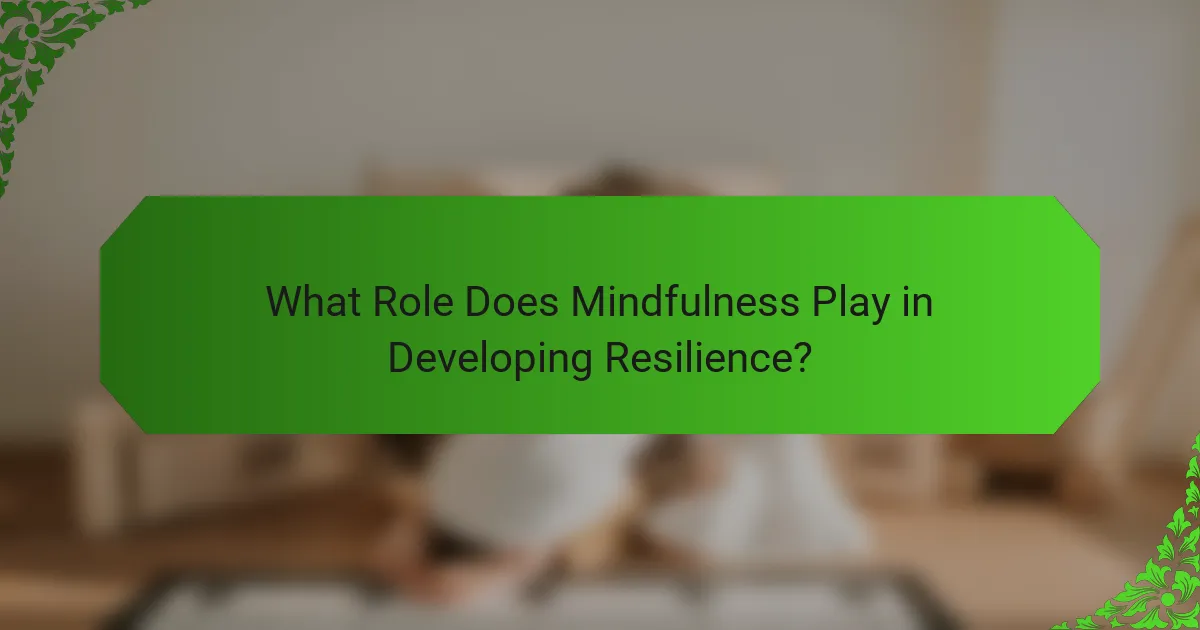
What Role Does Mindfulness Play in Developing Resilience?
Mindfulness significantly enhances resilience by fostering emotional regulation and self-awareness. Practicing mindfulness helps children recognize their thoughts and feelings, enabling them to respond to challenges more effectively. This skill is crucial for developing emotional intelligence, which is a unique attribute of resilient individuals. Research shows that children who engage in mindfulness practices exhibit lower levels of stress and anxiety, leading to improved coping strategies in difficult situations. Consequently, integrating mindfulness into family routines can strengthen connections and support children’s resilience development.
What mindfulness practices are effective for children?
Mindfulness practices effective for children include deep breathing, guided imagery, and body scans. These techniques enhance emotional regulation and resilience. Deep breathing helps children manage stress by focusing on their breath, while guided imagery fosters relaxation through visualization. Body scans promote awareness of physical sensations, encouraging mindfulness. Regular practice leads to improved emotional intelligence and stronger family connections.
How does mindfulness impact stress management in children?
Mindfulness significantly enhances stress management in children by improving emotional regulation. It equips them with tools to recognize and respond to stressors effectively. Research indicates that practicing mindfulness can reduce anxiety levels and increase resilience. Children who engage in mindfulness exercises demonstrate better focus, improved mood, and greater empathy towards others. These benefits collectively foster emotional intelligence, enabling children to navigate challenges with a calm and balanced approach.
What are the benefits of mindfulness for family dynamics?
Mindfulness enhances family dynamics by fostering emotional intelligence, communication, and resilience in children. It cultivates empathy, reduces stress, and strengthens connections. Practicing mindfulness together encourages shared experiences, creating a supportive family environment. As a result, families develop stronger bonds and improved conflict resolution skills.
How can families incorporate mindfulness into daily routines?
Families can incorporate mindfulness into daily routines by setting aside specific times for practice. Establishing a morning or evening ritual can help children learn to focus and reflect.
Engaging in activities like mindful breathing or guided meditation during family meals fosters connection and awareness. Using simple prompts, such as “What are you grateful for today?” encourages emotional expression.
Creating a mindful environment is essential. Reducing distractions, such as turning off screens, allows for deeper conversations and connection.
Incorporating mindfulness into everyday tasks, like walking or cooking, transforms ordinary moments into opportunities for awareness. This consistent practice nurtures emotional intelligence and builds resilience in children.
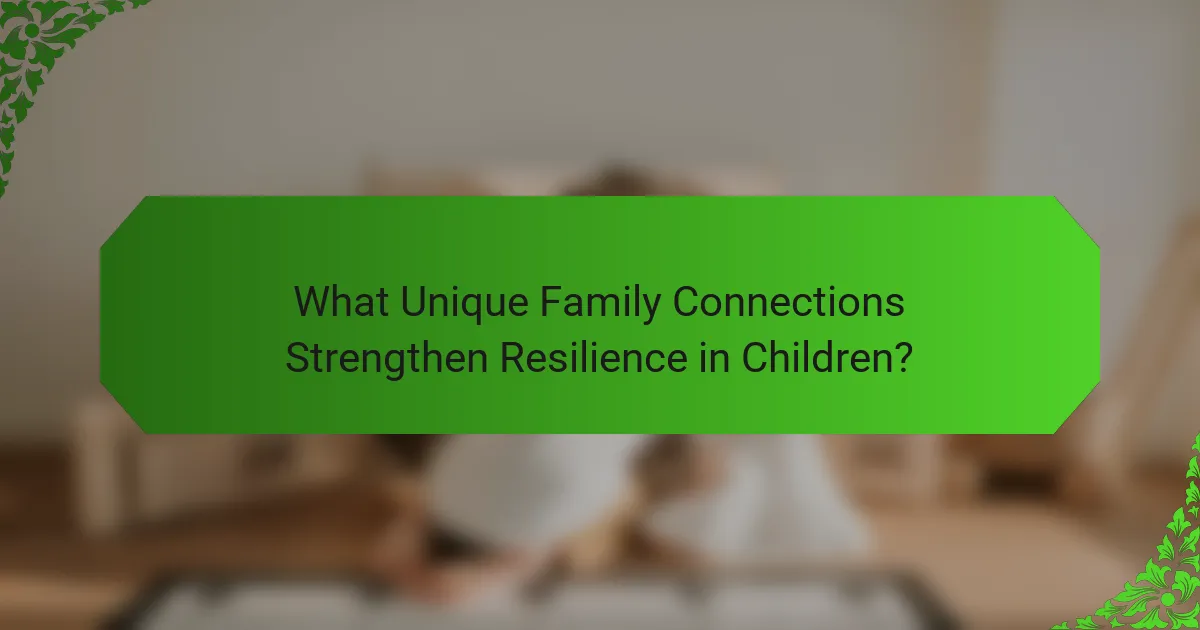
What Unique Family Connections Strengthen Resilience in Children?
Strong family connections enhance resilience in children by providing emotional support and security. These connections foster a sense of belonging, which is vital for developing emotional intelligence. Engaging in open communication allows children to express their feelings and learn coping strategies. Family routines and traditions create stability, reinforcing a child’s ability to adapt to challenges. Additionally, shared experiences strengthen bonds, promoting mindfulness and a collective approach to problem-solving. Such unique attributes of family dynamics are essential for nurturing resilience in children.
How do strong family bonds contribute to a child’s emotional wellbeing?
Strong family bonds significantly enhance a child’s emotional wellbeing by providing stability and support. These connections foster a sense of belonging, which is essential for developing resilience. Children with strong family ties are more likely to express their emotions, leading to improved emotional intelligence. Research indicates that children who feel secure within their family unit are better equipped to handle stress and adversity. As a result, they are more adept at navigating challenges, which contributes to overall mental health.
What activities can families engage in to build stronger connections?
Families can engage in various activities to build stronger connections, such as shared meals, outdoor adventures, and game nights. These activities foster communication and teamwork. Regular family meetings enhance emotional intelligence by encouraging open discussions. Mindfulness practices, like yoga or meditation, can also strengthen bonds by promoting shared experiences and emotional awareness. Prioritizing quality time together cultivates resilience in children, equipping them with essential social skills.
How can open communication enhance family resilience?
Open communication significantly enhances family resilience by fostering trust and emotional connection. It encourages children to express feelings, leading to improved emotional intelligence. Families that engage in open dialogues can navigate challenges more effectively, creating a supportive environment. This proactive approach builds mindfulness and strengthens family bonds, equipping children with vital coping skills.
What role does shared experiences play in family bonding?
Shared experiences significantly enhance family bonding by fostering emotional connections and resilience. Engaging in activities together, such as family outings or game nights, creates lasting memories that strengthen relationships. Research shows that children who participate in shared activities exhibit higher emotional intelligence, as these experiences teach empathy and cooperation. Moreover, these moments promote mindfulness, encouraging families to be present and engaged with one another. Ultimately, shared experiences serve as a foundation for strong family connections, helping children navigate challenges with resilience.
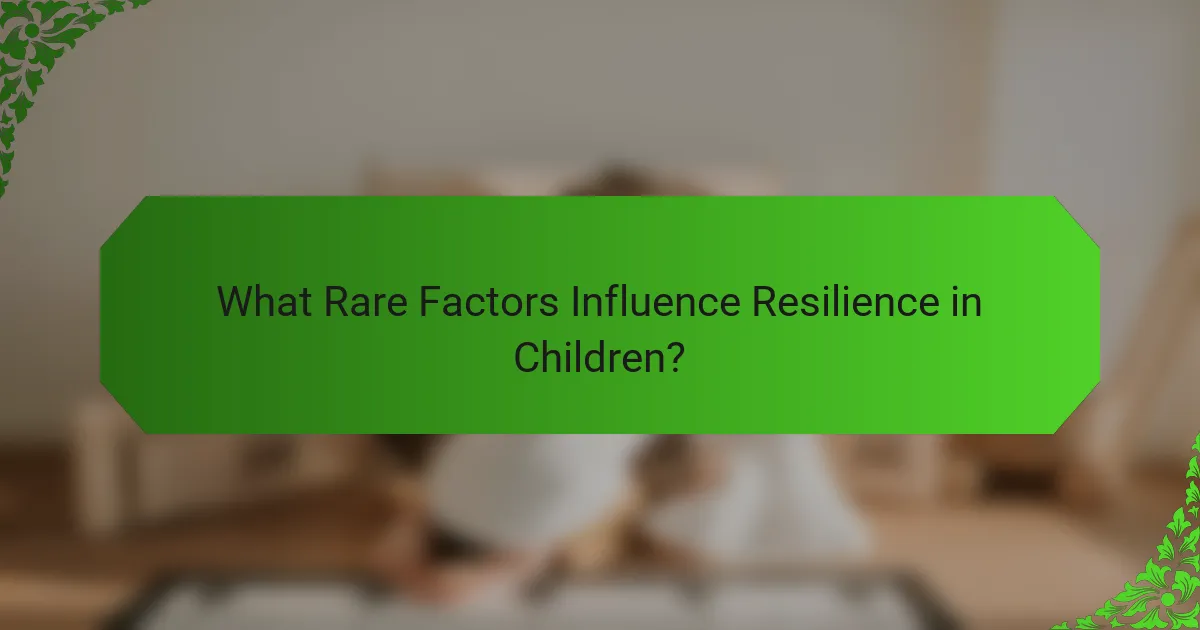
What Rare Factors Influence Resilience in Children?
Rare factors that influence resilience in children include unique family dynamics, cultural background, and exposure to adversity. Strong family connections provide emotional support, while diverse cultural experiences foster adaptability. Additionally, children who face manageable challenges often develop coping strategies that enhance resilience. These factors collectively nurture emotional intelligence, enabling children to thrive despite difficulties.
How do cultural differences affect resilience-building practices?
Cultural differences significantly influence resilience-building practices in children. Various cultures prioritize emotional intelligence, mindfulness, and family connections differently, shaping the methods used to foster resilience.
For example, collectivist cultures often emphasize strong family ties and community support, which can enhance emotional security. In contrast, individualistic cultures may promote self-reliance and personal achievement, impacting how children learn to cope with challenges.
Additionally, unique attributes such as communication styles and parenting approaches vary across cultures, affecting children’s emotional development and resilience. Understanding these differences is crucial for tailoring effective resilience-building strategies that resonate with diverse cultural backgrounds.
What unique challenges do single-parent families face in fostering resilience?
Single-parent families face unique challenges in fostering resilience due to limited resources and support. Emotional stress from single parenting can hinder effective communication, impacting children’s emotional intelligence. Additionally, time constraints reduce opportunities for mindfulness practices, which are vital for resilience. The absence of a co-parent may create feelings of isolation, affecting strong family connections. These factors collectively challenge the ability to nurture resilience in children.
How can community support networks aid in resilience development?
Community support networks significantly enhance resilience development in children by providing emotional and social resources. These networks foster strong family connections, promote emotional intelligence, and encourage mindfulness practices. Support from peers and adults helps children navigate challenges effectively, leading to improved coping skills and adaptability. Engaging in community activities also cultivates a sense of belonging, which is vital for emotional well-being. As a result, children with robust support networks demonstrate greater resilience in facing life’s adversities.
What uncommon strategies have proven effective in enhancing resilience?
Uncommon strategies for enhancing resilience in children include fostering emotional intelligence through storytelling, practicing mindfulness with nature walks, and strengthening family connections via shared activities. These approaches nurture adaptability and coping skills. For instance, storytelling enhances emotional understanding, while nature walks promote mindfulness, leading to improved focus and emotional regulation. Shared family activities create a supportive environment that reinforces resilience, enabling children to face challenges effectively.
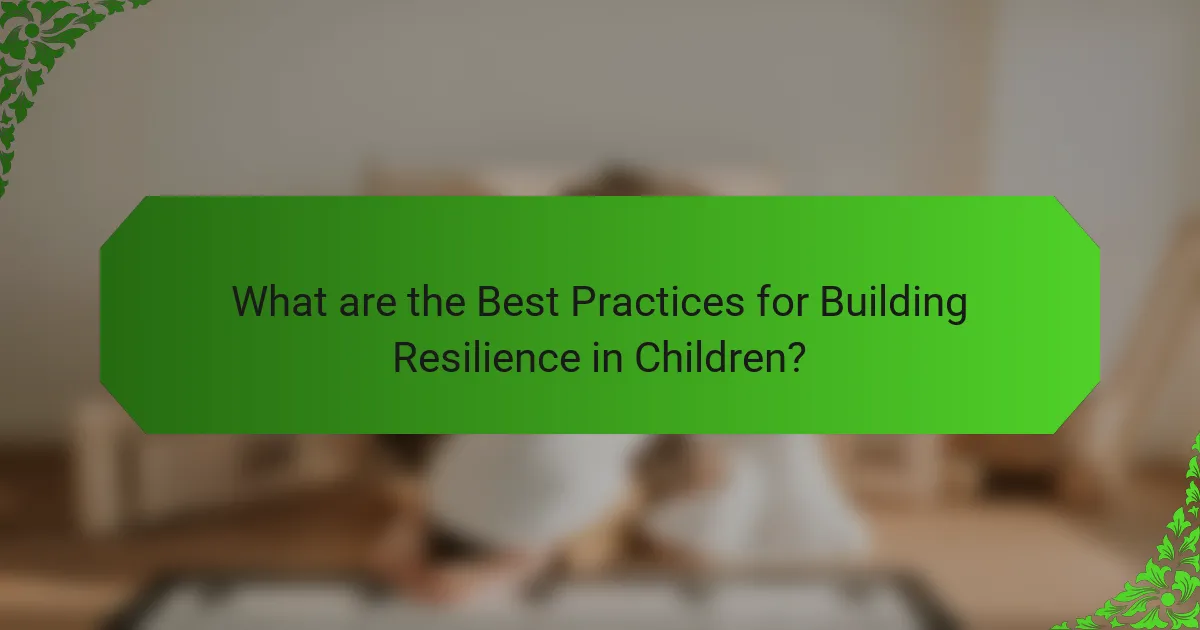
What are the Best Practices for Building Resilience in Children?
Building resilience in children involves fostering emotional intelligence, mindfulness, and strong family connections. Encourage open communication to help children express feelings. Teach problem-solving skills to enhance coping mechanisms. Promote mindfulness practices, such as meditation, to improve focus and emotional regulation. Establish routines that provide stability and security. Engage in family activities that strengthen bonds and create a supportive environment. These practices collectively nurture resilience, enabling children to navigate challenges effectively.
What common mistakes should families avoid when fostering resilience?
Families should avoid common mistakes that hinder resilience development in children. These include overprotectiveness, dismissing emotions, neglecting communication, and failing to model problem-solving skills. Overprotectiveness can prevent children from experiencing challenges, while dismissing emotions invalidates their feelings. Neglecting communication limits emotional expression, and not modeling problem-solving skills deprives children of valuable coping strategies. By recognizing and addressing these pitfalls, families can foster a nurturing environment that strengthens emotional intelligence and resilience.
How can parents model resilience for their children?
Parents can model resilience by demonstrating emotional regulation, problem-solving skills, and a positive mindset. They should openly discuss challenges, showing how to cope and learn from setbacks. Encouraging children to express feelings fosters emotional intelligence. Practicing mindfulness techniques together can enhance focus and reduce stress, reinforcing the importance of mental well-being. Strong family connections provide a support system, allowing children to feel secure and valued, which is essential for building resilience.
What expert insights can guide families in this journey?
Expert insights emphasize the importance of fostering emotional intelligence, mindfulness, and strong family connections in children. Families can enhance resilience by engaging in open communication, modeling positive coping strategies, and creating a supportive environment. Regular family activities promote connection and emotional bonding. Mindfulness practices, such as meditation or deep breathing, help children manage stress effectively. Additionally, teaching empathy and emotional regulation equips children with essential skills for navigating challenges. Prioritizing these elements cultivates a strong foundation for resilience in children.
